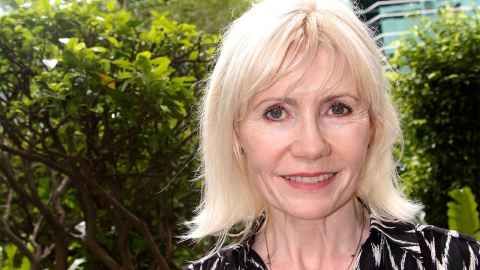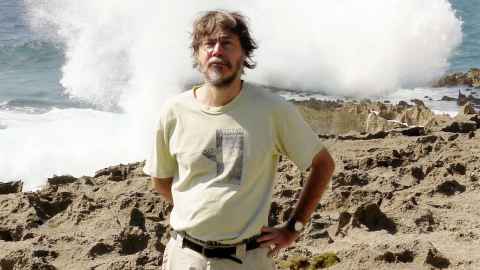Around the globe
27 November 2019
Ingenio catches up with three alumni living overseas and finds out what they are up to and where.
Jenny Harlen: Sweden and Myanmar

“Learning not to let fear get in the way of anything. Always choosing what feels right, rather than what other people think is right. Never choosing the path of most money, but always the path of the most interesting challenge.”
These are Jenny Harlen’s life lessons. The girl from Raumati Beach today runs sustainability businesses in both Sweden and, lately, Myanmar. It’s a place with challenges in spades.
“Myanmar’s a country where more or less nothing works, a political disaster, but the people are the nicest you could meet anywhere.”
Jenny’s businesses focus on making a difference with Bokashi – a composting method that uses a fermenting agent to speed the process and can be done anywhere, in a bucket.
Jenny says she fell into a business degree at the University of Auckland.
“Straight from school, and without any clear career goals, I just saw it as a way of being able to support myself in the future – somehow.”
But the future had to wait. For five years after graduation she backpacked around the world. There were a few odd jobs and when she met her Scandinavian partner, they moved to Sweden.
She found her passion 11 years ago in creating Bokashi Sweden. Getting the business to the point where it’s turning over a million euros annually has been a hard slog, but Jenny runs it now as an online business. That freed her up to focus on “saving soils” in a new place.
“Myanmar is one of the countries that will bear the brunt of climate change,” she says. “It is very real here, made all the more tragic by the lack of basically any infrastructure.”
She says everything is a challenge.
“Language, culture, educational backgrounds, the works. I live in hostel dorms, sleep on bamboo mats in our staff houses, and sometimes end up housesitting in fancy lakeside houses and apartments with pools. A lot of contrasts!”
It’s been a 30 year-plus learning curve, but a rewarding one. Her advice is to learn the elements of business early on, and set your goals.
“Having done that, let it all go and do what you think makes sense. Because then, one day, you can look back and see that it really does make sense and that you have lived your life in the way you were always meant to.”
Jane McGuire Ketchum: Hong Kong

A Bachelor of Arts can take you many places – just ask Jane McGuire Ketchum. Jane is a Hong Kong-based director and regional editor for one of Japan’s biggest financial companies, Daiwa Capital Markets. She admits it’s one of the most unlikely careers for an arts major, but it’s thanks to the grounding she got at the University of Auckland.
“I credit my arts degree with giving me the confidence and skills to take on a number of different and interesting jobs. That’s the beauty of a BA, it prepares you for anything!”
Jane majored in Japanese in the early 1980s, and even then it was an unusual choice. There were just eight in her final year Japanese class.
“At the time, Japan was New Zealand’s largest trading partner and my parents encouraged me to pick up the language because they thought it offered a promising career path.”
Hedging her bets, she added some business and economics papers to her degree.
After teaching English in Japan, and doing a variety of jobs around the world, Jane returned to Japan in 1992. Her fluent Japanese – and maybe those business papers – landed her a job as a financial editor in the equity research department of an investment company. That led to her current job delivering analysis and content for fund managers. It’s a demanding field, but one in which she thrives.
“The rise of digital technology has led to clients expecting to receive tailor-made, commercially viable research instantly and often on different platforms.”
She lives with her husband, whom she met in Hong Kong, children and two dogs, on the outskirts of Hong Kong.
“Our house is surrounded by country parks, rolling hills and beaches – not a picture many would conjure up when thinking of Hong Kong! Actually, few people realise that about 75 percent of Hong Kong comprises country parks and rural areas.”
Looking back, she says she could never have imagined where that arts degree would take her.
“I feel fortunate to have a job I enjoy and still find challenging, and that allows me to live in one of the most dynamic cities in the world.”
Peter Matthews: Japan

Tracing the path of taro around the world has taken Peter Matthews on his own epic journey. Peter is a professor, researcher and curator at the National Museum of Ethnology, Japan (Minpaku) and his work on taro is a way to examine the human journey.
“The essential question that guides me is ‘how can we see the past?’” he says.
Taro is an ancient crop not just used by Polynesians. It has also been a staple in Asia and Africa for thousands of years.
Peter’s first degree was a BSc at the University of Auckland. But an archaeology field trip sparked his interest in social sciences. He began an MSc on the study of plants and animals as tracers of human migration. With a PhD scholarship in Australia, he focused on taro.
Looking back, he is a great believer in keeping your options open.
“I was cutting my own path through the forest, so to speak. Not any predefined ‘career path’. The concept of planning a career in advance always seemed very strange to me.”
He’s never become fluent in Japanese, but his work is published in English, his wife is Japanese, and his colleagues are multilingual.
He and his wife and son live in an apartment on the boundary of Kyoto City that borders some farmland and they enjoy growing vegetables in a community garden. He continues to examine the complex cultural and evolutionary history of taro, and his work throws up the big questions.
“Seeing the past can be fun, scary and useful. The past is also unfathomable, but I am glad that the metaphorical ocean is deep. Forests can also be deep, but they are too easily cut and burned. Fortunately, they can also regenerate.
“The living world is powerful. I am a pessimistic optimist in the face of climate change.”
– By Wendy Colville
This article first appeared in the Spring 2019 issue of Ingenio.
Email Ingenio.
-
Ingenio Spring 2019. Size: 3.2 MB.
Document Description: Download the full magazine.